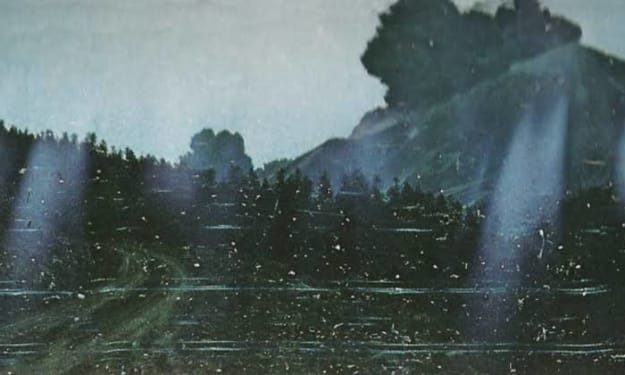Content warning
This story may contain sensitive material or discuss topics that some readers may find distressing. Reader discretion is advised. The views and opinions expressed in this story are those of the author and do not necessarily reflect the official policy or position of Vocal.

Title: Beyond the Horizon: Exploring the Ethereal Realms of Heaven and Hell
Introduction:
In the vast tapestry of human belief systems, few concepts are as pervasive and captivating as those of Heaven and Hell. Across cultures and religions, these ethereal realms have captured the human imagination, serving as metaphysical landscapes that promise reward or punishment in the afterlife. In this exploration, we delve into the multifaceted dimensions of Heaven and Hell, examining their historical, cultural, and spiritual significance.
Historical Perspectives:
The roots of the concepts of Heaven and Hell can be traced back to ancient civilizations, where ideas about an afterlife were interwoven with religious and mythological narratives. In ancient Egyptian mythology, for example, the deceased were believed to undergo a judgment process before entering the afterlife, with their hearts weighed against the feather of Ma'at.
In Greco-Roman traditions, the concept of an afterlife was diverse, with Hades serving as the realm of the dead. The idea of reward and punishment, however, gained prominence in later religious traditions, shaping the evolving narratives of Heaven and Hell.
Religious Perspectives:
Heaven and Hell are integral components of various religious doctrines, each offering its unique interpretation of these otherworldly realms. In Christianity, Heaven is often depicted as the abode of God, reserved for the righteous, where eternal joy and communion with the divine await. Conversely, Hell is portrayed as a place of torment and separation from God, reserved for those who have deviated from moral and spiritual principles.
Islam similarly envisions Heaven (Jannah) as a place of eternal bliss, described vividly in the Quran, while Hell (Jahannam) is depicted as a realm of punishment for those who reject the teachings of Islam. Hinduism, Buddhism, and other major religions also incorporate the concept of an afterlife, each with its nuanced interpretation of Heaven and Hell.
Cultural Interpretations:
Beyond religious contexts, Heaven and Hell have permeated cultural narratives, literature, and art. Dante Alighieri's "Divine Comedy," for instance, provides a vivid portrayal of Hell's various circles and layers of punishment. Similarly, countless works of art depict celestial visions of Heaven and the infernal landscapes of Hell, reflecting the artists' interpretations and the prevailing cultural and religious beliefs of their time.
Symbolism and Allegory:
Heaven and Hell often serve as potent symbols and allegories in literature and art. These metaphysical realms become vehicles for exploring morality, ethics, and the human condition. In John Milton's "Paradise Lost," the epic poem delves into the fall of Lucifer and the consequences that follow, offering a nuanced examination of sin, redemption, and the nature of evil.
Symbolic representations of Heaven and Hell can also be found in everyday language and expressions. Phrases such as "heaven on earth" and "hellish conditions" reflect the enduring influence of these concepts on human thought and language.
Ethical Implications:
The belief in an afterlife, complete with rewards and punishments, has profound ethical implications. For believers, the prospect of Heaven serves as an incentive to live virtuously, guided by moral and spiritual principles. Conversely, the fear of Hell acts as a deterrent against transgressions and immoral behavior.
Critics argue that the promise of reward or punishment in the afterlife can be a double-edged sword, potentially influencing behavior through fear rather than genuine moral understanding. The ethical dimensions of Heaven and Hell continue to be a subject of philosophical discourse, probing the nature of morality and the role of divine judgment in shaping human conduct.
Contemporary Perspectives:
In the modern era, the concept of Heaven and Hell has undergone reinterpretation and reevaluation. As societies become more secular, some individuals may view these notions as metaphorical or symbolic representations of the human experience rather than literal, afterlife destinations.
The question of whether belief in Heaven and Hell is a psychological construct that provides solace, moral guidance, or a framework for understanding the mysteries of existence remains a topic of scholarly inquiry. Some argue that these concepts persist as part of the human psyche, offering comfort in the face of mortality and a sense of justice in an often chaotic world.
Heaven and Hell, as timeless and transcendent concepts, continue to shape the spiritual, cultural, and ethical landscapes of humanity. Whether viewed through the lens of religious doctrine, cultural symbolism, or allegorical exploration, these realms offer a lens through which humans grapple with the profound questions of life, death, and the nature of the divine. As beliefs and perspectives evolve, Heaven and Hell endure as enduring symbols that resonate across time and space, inviting contemplation and reflection on the eternal mysteries that lie beyond the horizon.
About the Creator
Akash
Every additional piece of content you learn contributes to broadening your perspective and increase your expertise. The more you read, the more you learn, and the more equipped you become to navigate the complexities of the world around you






Comments
There are no comments for this story
Be the first to respond and start the conversation.